Note: This post may be too long for email. Click through to read it on the internet.)
I’m about three chapters into The Hunter by Tana French, and I’m worried about the dogs in this book.
The Hunter is a sequel to The Searcher, the story of ex-Chicago cop Cal Hooper who moves to a small, seemingly bucolic Irish town in search of some peace from a painful divorce and his spiritually draining job. Trouble finds Cal in the form of Trey, a young girl whose father has abandoned the family, and whose older brother has gone missing. Cal takes Trey under his wing and goes looking into Brandon’s fate, entangling himself in the lives of others in ways he was trying to avoid, but which his character and sense of duty requires.
The Hunter finds Trey now thriving under Cal’s influence as they work together to reclaim and repair old furniture. Cal is also in a comfortable relationship with Lena, a kind of co-mentor to Trey, and all of them, Cal, Trey, and Lena have dogs, which French shows to be ever present, loyal, and obedient companions and protectors.
French is a crime novelist, one of our best, which lets me know that trouble is coming, and has in fact already arrived in the form of Trey’s father, Johnny, who has returned from years of exile with a get rich scheme tied to a foreign investor into which he’s trying to draft what seems like the entire town.
I’m worried about those dogs.
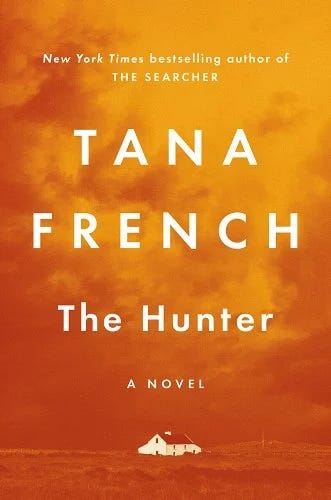
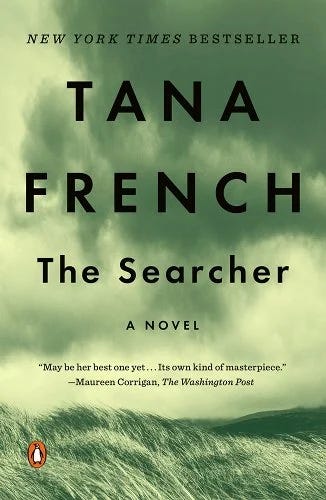
I’m typing this in bed joined by my own two dogs, Quincy and Baxter, and I wish I could say they were as useful and obedient as the dogs of The Searcher, but they are not unless you’re looking for a dog that will bark at the UPS truck. They are, however, ever present.
I’m not even sure they’re particularly loyal. Quincy seems obsessed with us, but when we drop him off at the sitter’s when we go out of town we get a picture of him on whatever lap is handy. I think he’s just needy.
I’m worried about the dogs in The Searcher because I have an extreme sensitivity to stories about animals (particularly dogs) in peril or distress. Even a happy dog story can get a little emotionally overwhelming at times.
I am a dedicated user of DoesTheDogDie.com a website dedicated to tracking potential emotional triggers in media so those of us with particular sensitivities can prepare ourselves. The most believable part of John Wick is that he would go on a multi-film revenge spree because someone killed his puppy. I could see resorting to similar behaviors.
Fortunately, the dogs that have been Mrs. Biblioracle’s and my companions have had very normal doggie lifespans before passing on from natural causes, so I haven’t had to dedicate my life to seeking justice on behalf of my pooch. I can actually mark my career by thinking about which dog was with me while I was going through a particular phase. Quincy and Baxter are our third pair following Truman and Oscar, who were preceded by Sam and Scully.
I don’t know for a fact that any dogs are going to come to harm in The Searcher, but French’s mastery of atmosphere and description bring the world and the dogs within it to life so evocatively that even in innocuous moments, you feel the emotion. This is from the end of an scene where Cal and Lena have been talking about what they should do about the return of Trey’s father, where Cal resolves to try to stay out of it, a signal in a crime novel that he is definitely going to be involved.
After Cal expresses his resolution, he invites Lena on a walk. If it isn’t clear, Rip, Nellie, and Daisy are the dogs. Daisy is older, and the mother of Rip and Nellie.
Lena tucks her hand through his elbow and walks. Rip and Nellie follow them, Rip taking big bounds over the long grass just for the fun of it, as they head for the road that twists away between the fields, faint and pale in the starlight. The night flowers have the rich, honeyed sent of some old cordial. Daisy opens one rolling eye to watch them on their way, and then goes back to sleep.
I can get a little misty just picturing it, and I hardly know these dogs, dogs who don’t actually exist except as a product of Tana French’s invention and the reader’s imagination.
What’s up with that?
These are just some of the dog books I remember from my many years of reading.
I mean, come on…this still may be the GOAT of all dog books. A boy, a farm, his dog, the dog sacrificing himself for the good of the family. Also a classic movie, but it’s a case where the book is superior.
As heartbreaking and beautiful as Old Yeller, Sounder embeds the dog story in a narrative of identity, race, and shaping of the self. I read this book about ten times after first being introduced to it as a kid wanting to savor its emotional power.
Another classic novel for kids, an absurdist adventure with the (literal) “watchdog,” Tock serving as a guide and sidekick to Milo as he navigates a surreal adventure. I’m normally not a huge fan of anthropomorphizing animal stories, but Tock is his own creature and an unforgettable supporting character.
Steinbeck’s classic travelogue of his trip across America with his dog companion, Charley. Steinbeck reportedly knew his health was failing and his urge was to hit the road with his dog and see the country one last time. Not a bad way to go out.
Edgar Sawtelle is born mute into a family that raises a very unique breed of dogs on their family farm. Edgar is forced to flee the farm, accompanied by three young dogs and they live in the wild together until additional events give Edgar a choice. A saga that is apparently patterned after the story of Hamlet (something about which I had no clue as I read it), the degree to which you come to care about these dogs is extraordinary. I was wondering why David Wroblewski had never published another novel since the 2009 release of this book, but in doing my internet digging around for the post, I saw that he has what looks to be a prequel to The Story of Edgar Sawtelle, titled Familiaris, in June.
As I said, I’m not a big fan of the books that anthropomorphize dogs and turn them into wise little souls like a four-legged Dalai Lama. As an example, I’m thinking about A Dog’s Purpose by W. Bruce Cameron, which dials up the adorableness factor to eleven and becomes sort of cloying. In contrast, You Are a Dog by my old friend Terry Bain makes a concerted effort to see the world truly through the eyes of a dog, not as an anthropomorphized furry human. I don’t know if You Are a Dog is still in print, but it’s very much worth seeking out.
Don’t get me wrong, I’m very attached to my dogs, but Quincy has a brain the size of a golf ball at best. He’s no genius or wise man. He’s a furry little pal with halitosis and amazing sideburns.
I know I’m not the only animal lover in the crowd here. What are some books featuring non-human characters that you particularly love?
Links
It’s not out for a couple weeks, but I could not contain my enthusiasm for James by Percival Everett in this week’s Chicago Tribune column.
Over at Inside Higher Ed I wrote about how planned experiments on using facial recognition on students in classrooms gets a hard no from me.
At his newsletter,
explains why the name “Paul” makes perfect sense in Dune.At his newsletter
explores how the flood of AI content is murdering the Internet.The 2024 Tournament of Books starts next Wednesday.
The opening lines of Sally Rooney’s next novel are now available. It publishes in September.
LitHub has the 24 books that published this past week. The New York Times has 15 books coming in March.
Enjoy this list of “The Essential James Baldwin” from Robert Jones Jr.
High quality literary humor from McSweeney’s this week: “Charles Bukowski’s Dune” by John K. Peck
Recommendations
1. Encyclopedia of an Ordinary Life by Amy Krouse Rosenthal
2. The Immortalists by Chloe Benjamin
3. A Quitter’s Paradise by Elysha Chang
4. You Could Make This Place Beautiful by Maggie Smith
5. Late Bloomers by Deepa Varadarajan
Alycia K. - Portland, OR
I stopped recommending pandemic novels for obvious reasons, but really this recommendation is not quite a pandemic novel in that a pandemic is just an excuse to shake up a character who mostly wants to figure out what it means to be happy in one’s own life: Severance by Ling Ma.
1. Big Swiss by Jen Beagin
2. The Ten Thousand Doors of January by Alix E. Harrow
3. Weyward by Emilia Hart
4. Snow Road Station by Elizabeth Hay
5. The Falcon's Eyes by Fracesca Stanfill
Lisa R. - Calgary, AB
Maybe this choice is too clever given the closeness of the title to one of the books in Lisa’s list, but it’s what my Biblioracle sense are indicating: Wayward by Dana Spiotta.
1. Demon Copperhead by Barbara Kingsolver
2. The Family Roe by Joshua Prager
3. Tom Lake by Ann Patchett
4. Oscar Wars: A History of Hollywood in Gold, Sweat and Tears by Michael Schulman
5. The Sympathizer by Viet Thanh Nguyen
Leigh M. - Salt Lake City, UT
It seems like we can’t stop wondering what’s really going on in small town America. The Locals by Jonathan Dee takes an intimate look at one in New England in the aftermath of 9/11, which doesn’t feel too different from right now, honestly.1
I will admit to a bit of a recommendation backlog, but soon I will be free again to do a midweek recommendations post, so if you’re looking for help, don’t hesitate to reach out following the instructions at the link below.
Four more days and I’m shipping off the final section of the book to my editor and it will be her problem for a week or two. I’m actually feeling increasingly good about it, and not just because it’ll be one step closer to done. It’s a good feeling when you sense that your work is continuing to improve over time, and that’s how it feels, at least for now.
Don’t forget to share your dog books in the comments and I’ll see you all next week. Why not invite your reading friends to join us?
JW
The Biblioracle
All books (with the occasional exception) linked throughout the newsletter go to The Biblioracle Recommends bookstore at Bookshop.org. Affiliate proceeds, plus a personal matching donation of my own, go to Chicago’s Open Books and an additional reading/writing/literacy nonprofit to be determined. Affiliate income for this year is $33.30.




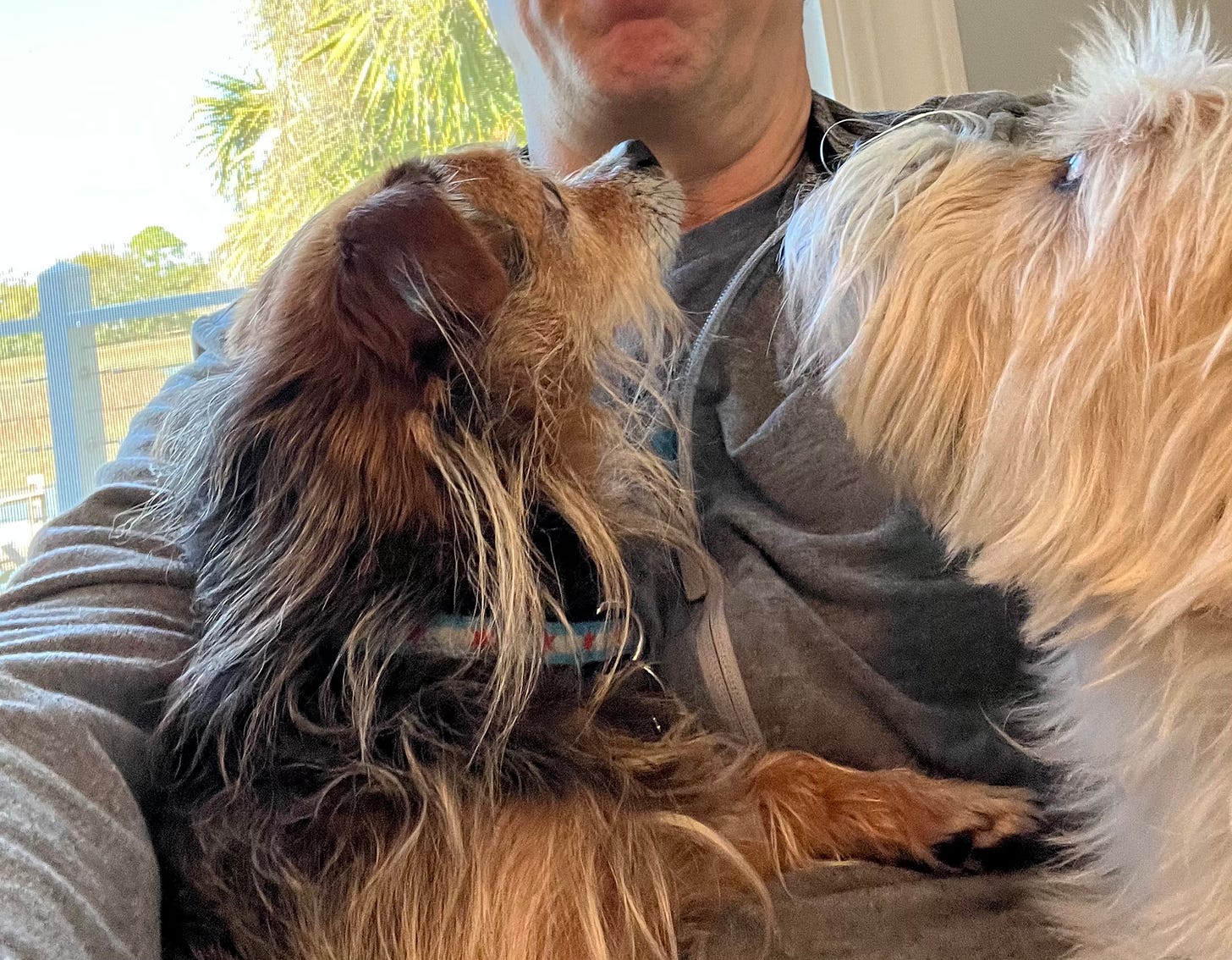
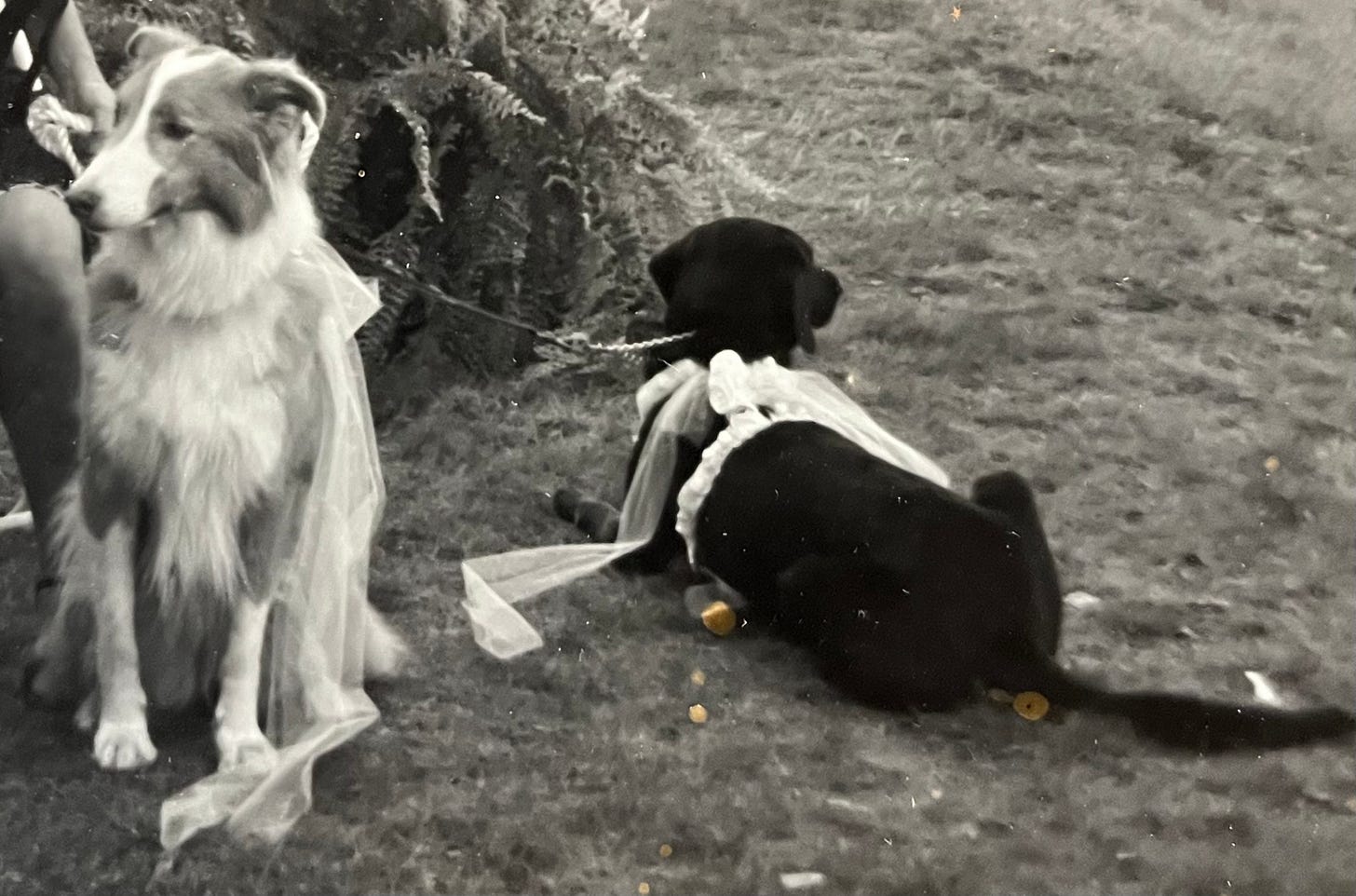

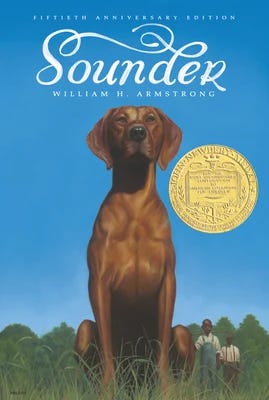
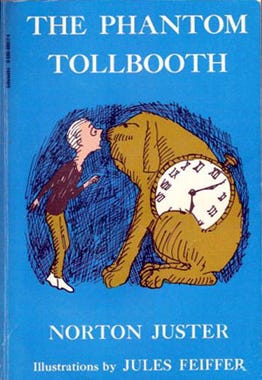


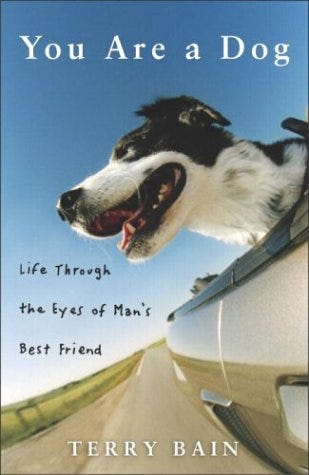

Where the Red Fern Grows was another a sad dog book. Those hunting hounds, I can hear their baying.
There are so many YA books where the dogs die, that Gordon Kormon wrote a book called No More Dead Dogs about a kid who's tired of books where the dog dies.
Does "Love That Dog " by Sharon Creech count? so good.
I always say don't start a book or movie if there's a dogs name in the title, it means the dog is gonna die. Not entirely true, but i'd rather play it safe.